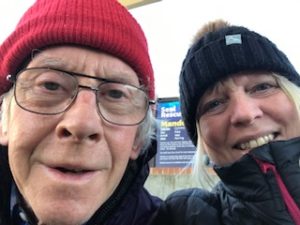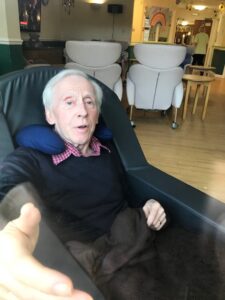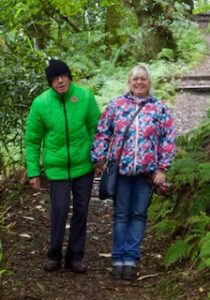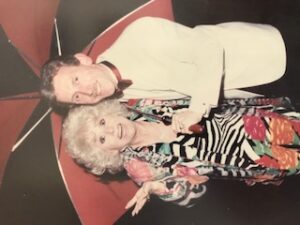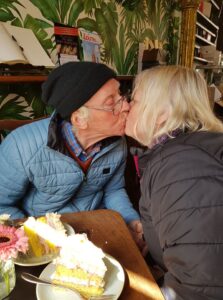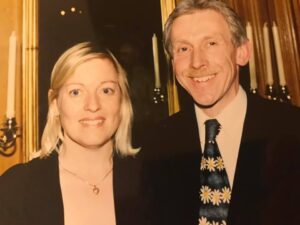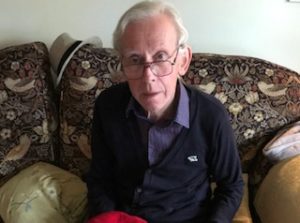When I was a Chindi Author (a group of indie writers in Chichester), Michael Parker was our elder statesman, the author who had been traditionally published, and who had time for everyone. It was hard to think I could come to respect him more, but since his beloved wife Pat died last year, he has written an incredible tribute which I hope to review for Frost next month.
 I have always been able to write. As a teenager at Grammar school, I used to write hooky notes for my mates and charge them one cigarette for each note. You could say I was earning royalties even then. I was a prolific reader too and often found myself in awe of the authors and how clever they were. But I never aspired to become a writer; that was something only the clever ones did: those with university degrees and a middle-class upbringing. For someone like me: a working-class lad with no qualifications, I never believed I could become a published author.
I have always been able to write. As a teenager at Grammar school, I used to write hooky notes for my mates and charge them one cigarette for each note. You could say I was earning royalties even then. I was a prolific reader too and often found myself in awe of the authors and how clever they were. But I never aspired to become a writer; that was something only the clever ones did: those with university degrees and a middle-class upbringing. For someone like me: a working-class lad with no qualifications, I never believed I could become a published author.
I started dabbling with storytelling in my mid-twenties and wrote a family saga. It never saw the light of day, but it did become the seed, that feeling that there was something there. I remember contacting the Daily Mirror and asking them how I could get my book published. I had no clue about the publishing world. Their advice was to get an agent. It was when I was in my late thirties that I finally succeeded, when Macmillan agreed to publish my first novel, North Slope, in 1978. The Financial Times called me a “gifted narrator”. As rewarding as that was, it didn’t mean I would become a successful author.
Years later, when I was living in Spain with my wife, Pat, I found myself writing and being published. Eventually I ended up with seven traditionally published novels; six of them with Robert Hale of London. I was published in Norway, Denmark and Canada. Now I have fourteen books to my credit: all of them available on-line. But the book I needed to write: the book I want to talk about now, was a tribute to my lovely Pat who sadly died of cancer last year, 2020.
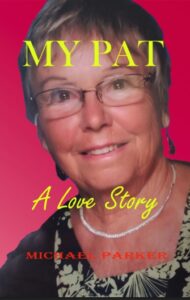 Pat became ill after a five-week trip to Australia and the Far East. She was diagnosed with cancer on our return after an examination for a spider bite. I looked after Pat for almost two years, here at home, until she finally succumbed to the disease. By this time, I’d already given up writing; there was no longer any inclination or desire. My sole reason for living was to be by Pat’s side and nurse her.
Pat became ill after a five-week trip to Australia and the Far East. She was diagnosed with cancer on our return after an examination for a spider bite. I looked after Pat for almost two years, here at home, until she finally succumbed to the disease. By this time, I’d already given up writing; there was no longer any inclination or desire. My sole reason for living was to be by Pat’s side and nurse her.
When it was all over, I was asked if I would start writing again. I would shake my head and say probably never. But my granddaughter, Gemma, wanted to know more about her Nan, and it was this that encouraged me to write down my memories after sixty years of marriage, and put them in book form: a tribute to my lovely wife. The book has now been published and is called, My Pat, a love story.
I don’t have enough time here to explain what a lovely woman Pat was, but the following is a short extract from the book:
I first laid eyes on Pat when she was fourteen. I was a “mature fifteen-year-old” who could not possibly have any interest in a girl as young as that. Besides, Pat was my mate’s little sister, and it was beyond parody to think I could have anything to do with her. But I still remember her dark hair, lovely eyes and generous mouth, plus the fact that she was wearing a canary yellow sweater. So, it stands to reason I couldn’t have noticed her. Four years later we were married.
Whether I’ll write again remains to be seen, but I am happy that I have published my best work ever.
You can learn more of me and my books by hopping over to my website: www.michaelparkerbooks.com.


